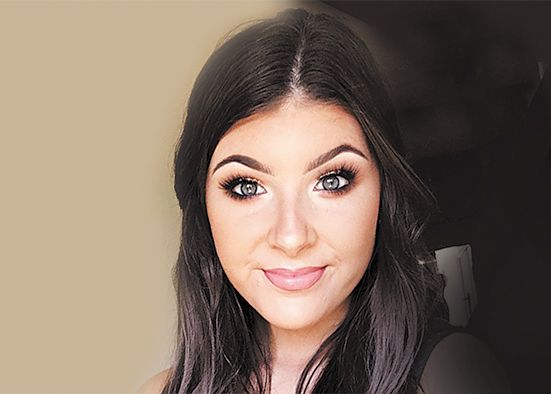Amy urges young people not to ignore cancer symptoms
Amy urges young people not to ignore cancer symptoms
9 February 2022

A DOWNPATRICK woman is urging young people to be on the look-out for cancer warning signs after being diagnosed with Hodgkin’s Lymphoma in her late teens.
Amy Curran initially mistook her cancer symptoms for a chest infection when she first noticed being unwell in 2020.
The 21 year-old is sharing her story to raise awareness of the warning signs of cancer to mark World Cancer Day last Friday.
She is calling on young people to check themselves regularly and visit their GP if they have any concern as part of a Teenage Cancer Trust campaign.
Amy, who is now back at work after having treatment for her cancer of the blood, explained: “I was having symptoms for well over a year before I was diagnosed. I kept going back and forth to the doctors and A&E with chest pains and they thought I had a chest infection or a kidney infection.
“They also diagnosed me with anaemia as I was tired and weak, so they gave me iron tablets. My mum kept saying it wasn’t like me to have no energy.”
One of the most visible symptoms she experienced was a sudden loss of weight.
Amy added: “I went from a size 12 to a 10-8 within a month. Even people who didn’t normally comment on my weight, like my grandparents, mentioned I had lost weight. Shortly afterwards in October 2020, a girl at work spotted the lump in my neck.
“If you have any doubts or are experiencing symptoms, trust your instinct and don’t be afraid to voice your concerns, even if it means getting a second opinion.”
Amy, who was supported by the Teenage Cancer Trust through her cancer ordeal, is one of a number of young people speaking out about their experiences to raise awareness and help others.
Now she is urging people to visit the Trusts’ website to get clued up on the warning signs.
According to new research from the charity, awareness of the five main warning signs of cancer in young people is “concerningly low” amongst those aged 18-24, with seven in ten not being able to identify correctly all five warning signs
The research, released on World Cancer Day, has revealed that from a list of the five most common warning signs of cancer in young people, only one – lumps bumps and swellings — could be identified correctly by the majority of respondents aged 18-24.
The other four warning signs of cancer in young people were notably less recognised by not only this age group, but by the general UK adult population as well.
The other issues identified that two thirds of 18-24 year-old did not recognise unexplained tiredness as a cancer indicator, or persistent pain, or awareness that mole changes could pose cause for concern.
However, seven out of ten 18-24-year-olds surveyed were able to correctly identify lumps, bumps and swellings as one of the five common warning signs, with six in ten stating that if they found a lump in their neck that hadn’t gone away after a few weeks they would book an appointment with their GP.
Teenage Cancer Trust chief nurse Louise Soanes said: “Cancer is far less likely to affect young people than older adults — but when it does it can have a devastating impact — so being able to spot potential warning signs that could lead to an earlier diagnosis really can make a difference.
“Unfortunately, our research suggests that there is concerningly low awareness of the most common warning signs of cancer in the 18-24 age range, and this could be one of the reasons it takes longer for young people to be diagnosed with cancer than older adults. But because cancer in younger age groups is considered rare, it could also be that GPs and other healthcare professionals are less likely to suspect cancer and refer young people with symptoms on for further investigation.
“Listen to your body and if you feel that something isn’t right seek medical help. It probably isn’t cancer, but it’s always best to check, so book an appointment with your GP to discuss your concerns. If you don’t feel like you’re getting the answers you need keep going back, because if a patient consistently presents with concerns, healthcare professionals should listen and take these seriously.”
These symptoms don’t necessarily mean you have cancer – but it’s always best to check. For more information visit www.teenagecancertrust.org.


